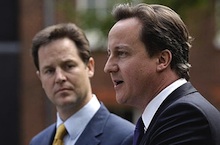
Newly elected British prime minister, Conservative party leader David Cameron has vowed to “alter the shape of British politics forever” as he took office at Downing Street this week alongside his deputy prime minister Nick Clegg, the leader of the Liberal Democrats.
Describing the deal as “a seismic shift”, they acknowledged that a final programme for government could take weeks to negotiate. Although the main points have been settled, it remains unclear what the new British policy on the North of Ireland will be.
Continuity on the peace process is likely to be maintained, although Cameron’s declared support for the active maintenance of the ‘United Kingdom’ -- including the Six Counties of the north of Ireland - appears at odds with key elements of the 1998 Good Friday Agreement.
One of Cameron’s first actions was the announcement of an extended war cabinet to include the heads of MI5, MI6 and other military chiefs. The ‘National Security Council’ will coordinate the war in Iraq and Afghanistan, as well as countering the threat posed in Ireland by the breakaway IRA groups.
The two leaders displayed an uneasy camaraderie for the cameras on Downing Street in a manner quickly mocked by the British tabloids as reminiscent of a comic double act.
But there were already signals that elements of the Liberal Democrats plan to walk away over Mr Clegg’s decision to throw his lot in with the Conservatives and become Cameron’s ‘sidekick’.
One of the last cabinet announcements was that of Owen Paterson, who was confirmed as the new British Direct Ruler. An avowed unionist, he has been the shadow minister for the past three years and replaces the outgoing Direct Ruler Shaun Woodward.
Party leaders in the Dublin parliament paid tribute to former British prime minister Gordon Brown and extended their congratulations to Cameron and Clegg.
Taoiseach Brian Cowen wished the new Prime Minister and Mr Clegg well in the formation of a new government.
Mr Cowen told the Dail he looked forward to meeting the new prime minister “in due course to build on the good relationships that successive governments have been able to establish between the Irish and British administrations in recent times in the hope that we can continue to co-operate and work together on items of common interest”.
He also paid tribute to Mr Brown, whom he had earlier described as a good friend of Ireland. The outgoing prime minister “showed a strong commitment to the implementation of the agreements of which both his government and ours were co-guarantors, and I wish him and his wife and family well for the future.”
Commenting on the end of 13 years of Labour rule in Britain, Sinn Fein President Gerry Adams said that “as Irish Republicans we obviously believe that British government rule in Ireland is wrong and should end. We have also been actively opposed to the wars and occupations in Iraq and Afghanistan carried out by the Labour government.
“However as 13 years of this Labour administration comes to an end it is important to acknowledge the contribution which the governments of Tony Blair and Gordon Brown made to the development of the Irish Peace Process.
“When Labour came to power in 1997 it was in the wake of the previous Tory government squandering the opportunity for peace generated by the first IRA cessation. Tony Blair’s contribution to the establishment of inclusive talks and the Good Friday Agreement they delivered was significant. Likewise Gordon Brown’s contribution at Hillsborough earlier this year. I wish him well.”
Deputy First Minister, Sinn Fein’s Martin McGuinness said he spoke with the new British Prime Minister David Cameron on Wednesday, and said the Tories would be on a steep learning curve if they are to properly handle the peace process.
Mr McGuinness highlighted the special relationship that the Conservatives have built with the unionist parties, but he noted: “That said, we can’t legislate for the hand that we are dealt. Throughout this process there have been many, many changes.
“We saw Clinton was in the White House, and then Bush entered the White House and now President Obama.
“There have been changes in England. Tony Blair, obviously a hard act to follow in terms of his knowledge and his ability to grasp the situation here, and also his willingness to own-up to the faults of British participation in what was wrong here since the foundation of the northern state.”
During an election campaign visit to the North, Mr Cameron said that if he were elected prime minister, he would promote and seek to reinforce British possession of the Six Counties. He is also on record, however, as saying that he would respect the agreements secured through the peace process and would seek to continue the close cooperation with the Dublin government.
Speaking after his telephone conversation with Cameron, Mr McGuinness said he “made it clear” to the new British PM that “as a society moving out of conflict and one which has suffered from decades of under investment we can simply not afford the sort of cuts he hinted at during the election campaign. I also made the case for the best block grant possible and impressed upon him the unity of parties here around these positions.”
The Mid-Ulster MP said the Saville Inquiry’s report into the Bloody Sunday massacre should be given to the Bloody Sunday families quickly and made public.
McGuinness also criticised the SDLP and unionist parties for exaggerating their influence at Westminster in a hung parliament.
“It is time to end that sort of fantasy politics and get down to the real work directly with the new British government,” Mr McGuinness said.
![[Irish Republican News]](https://republican-news.org/graphics/title_gifs/rn.gif)
![[Irish Republican News]](https://republican-news.org/graphics/title_gifs/harp.gif)

